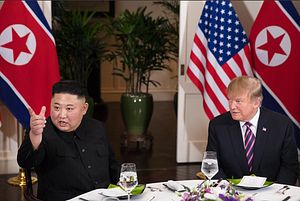U.S. President Donald Trump just kicked off his meeting with North Korean leader Kim Jong Un in Hanoi, Vietnam.
Pessimism around Trump’s meeting with Kim is not new. In fact, the Joint Declaration issued by the two leaders following their first summit in Singapore was heavily criticized as being too aspirational for positive U.S.-North Korea relations without having any concrete details. Since then, skeptics have pointed out that while the United States has undertaken some tension reduction measures, including cancelling large-scale U.S.-ROK joint military exercises, North Korea has not done anything since the Declaration to move toward denuclearization. If anything, critics have argued, the North Korean government repeatedly expressed its determination not to renounce its existing nuclear weapons and capability.
Going into the Hanoi Summit, pessimism had grown deeper among experts not only in the United States but also in Japan. To put it simply, there is a growing concern that Trump will accept whatever Kim Jong Un offers so that he can reach a deal and emerge successful out of the summit. Analysts worry that the next agreement might not contribute to the ultimate end goal –the denuclearization of North Korea – but instead pave the way to provide incentives to North Korea prematurely.
Japan is nervously monitoring what may come out of the Hanoi Summit. The reality for Japan is that there is no great outcome. Of course, Tokyo could hope for Trump to stand firm on the negotiating position that North Korea must offer a concrete plan of action toward its denuclearization, commit to curbing its conventional weapons including short- and medium-range ballistic missiles, and make meaningful progress on abduction issue. But given Trump’s impulse to “make a deal,” that is hardly an outcome that Tokyo can expect. Rather, it is far more likely that Trump agrees (even only in principle) to a deal that will undermine Tokyo’s security and other concerns vis-à-vis North Korea.
For one, Trump, desperate to reach a deal, is likely to take any verbal commitment from Kim about denuclearization and claim victory, while leaving concerns about Pyongyang’s missile capability – a much more acute national security concern for Japan — completely unaddressed. Worse yet, Trump could also offer to start the process of lifting economic sanctions as a measure to prove that United States is not hostile to North Korea before North Korea takes any action toward denuclearization.
In addition, despite Prime Minister Shinzo Abe’s urging, it is questionable how strongly Trump will press Kim on the abduction issue. The most likely way for Trump to bring this up would be in the context of Pyongyang’s need to improve its overall human right situation. However, the Singapore Summit didn’t provide much hope in this regard. The only humanitarian issue that was mentioned in the June 2018 Joint Declaration was the issue of the remains of U.S. prisoners of war/missing in action (POW/MIA) personnel. It is far from likely that in Hanoi Trump will urge Kim Jong Un to address the abduction issue with Japan in a meaningful way.
Furthermore, Trump could put issues such as the future of U.S.-South Korea alliance, including the number of U.S. troops in South Korea, on the negotiation table when he meets Kim. His previous decision to cancel major U.S.-ROK joint exercises because of the financial cost has already been a subject of much criticism, including from his own party, as can be seen in the legislation introduced by a Republican member of Congress that seeks to prevent the U.S. president from arbitrarily reducing the U.S. military presence in South Korea. The future of the U.S. troop presence in Korea potentially has a profound impact on Japan’s security posture, and yet Japan has only a limited influence (if any) on the discussion over this issue between the United States and South Korea, especially given the current poor state of Japan-South Korea relations. Japan can only hope that Trump will not put this issue on the table.
Therefore, for Japan, realistically speaking, the best possible outcome it can hope for from the Hanoi Summit is that the two leaders agree on some specific steps for Pyongyang’s denuclearization, while agreeing to let their respective governments’ officials continue negotiations on other issues of concern. However, this is still not a net positive for Japan because (a) it is essentially an embrace of the status quo, and (b) while any specific denuclearization steps are being implemented, Japan still faces the reality that it needs to co-exist with a nuclear North Korea.
This week’s Trump-Kim Summit, therefore, does not offer much optimism for Japan. If anything, its outcome may force Japan to considerably shift its threat environment.

































